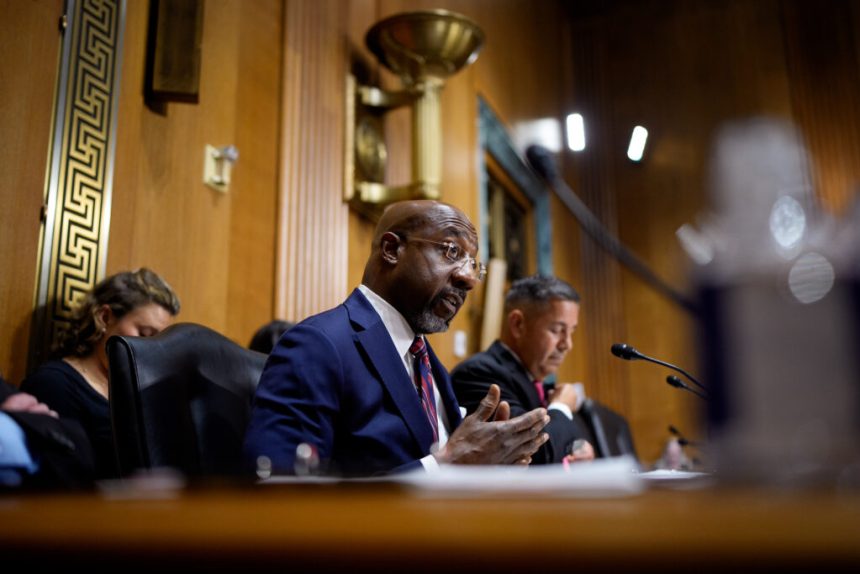U.S. Sen. Raphael Warnock, a Georgia Democrat, speaks at a Senate hearing earlier this month. Warnock and several other lawmakers commissioned a Government Accountability Office report which found that Georgia spent $54.2 million in less than five years to administer the country’s only Medicaid program with work requirements (Photo by Andrew Harnik/Getty Images)
Georgia spent $54.2 million in less than five years to administer the country’s only Medicaid program with work requirements – more than twice as much as it spent to provide health care to enrollees, according to an analysis released earlier this month by the Government Accountability Office.
The report suggests it will be expensive to implement the Medicaid work requirements included in the broad tax and spending law President Donald Trump signed on July 4.
Under that law, the 40 states plus the District of Columbia that expanded Medicaid under the Affordable Care Act must require the expansion population – low-income adults under 65 with incomes up to 138% of the federal poverty level – to either work or engage in other activities such as job training or higher education for at least 80 hours per month.
The law is projected to cut federal Medicaid spending by an estimated $911 billion over the next decade, largely because the new work requirements will push people off the rolls. The new rules take effect on Jan. 1, 2027.
Supporters say the work requirements will encourage people to get jobs that offer health care coverage. But critics argue that most Medicaid recipients already work, and that most people who lose coverage will be dropped because they fail to meet the reporting requirements.
In October 2020, Georgia received federal approval to test Medicaid work requirements for an initial 5-year period. Its program, called Georgia Pathways to Coverage, is available to people between the ages of 19 and 64, with incomes at or below the federal poverty level, who would not otherwise qualify for Medicaid. Georgia originally planned to begin enrollment in July 2021, but legal challenges delayed implementation until July 2023.
As of May 2025, Georgia reported that 7,463 people were enrolled, far fewer than the 25,000 the state had expected to enroll during the first year of the program.
Between 2021 and June 2025, Georgia spent $54.2 million on administrative costs, compared with $26.1 million on providing medical care, according to GAO. About $50.8 of the administrative spending went toward changing the state’s system for determining people’s eligibility and enrolling them. In addition, the state used $20 million it received under the American Rescue Plan Act of 2021 to advertise the program.
Georgia officials told GAO that the pause in implementation forced them to do some things twice, raising administrative costs by between 20% and 30%. This included IT system changes, coordination with other agencies, and staff training.
“Every state Medicaid program is different, and so the amount or proportion of administrative costs that states may have to upgrade their systems and implement the new work requirements can vary by state,” Michelle Rosenberg, the GAO health care director, said in an interview.
“I suspect some states may require less administrative spending, and other states may require more. But I do think this is the best information we have available on what states’ experiences may be like.”
The Georgia Department of Community Health, which oversees Georgia Pathways to Coverage, did not respond to multiple Stateline requests for comment.
U.S. Sen. Raphael Warnock of Georgia, one of the lawmakers who requested the GAO report, said it proves that Medicaid work requirements are a waste of taxpayer dollars.
“This report shows that Pathways is incredibly effective at barring working people from health coverage and making corporate consultants richer,” the Democrat said in a news release. “If Republican politicians were serious about getting people to work, they would have closed the coverage gap nationwide and cut out the government bureaucracy.”
Stateline reporter Shalina Chatlani can be reached at schatlani@stateline.org








